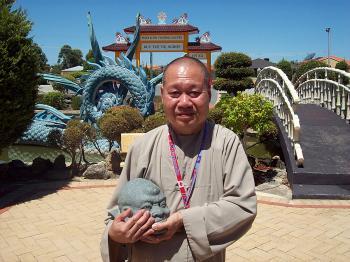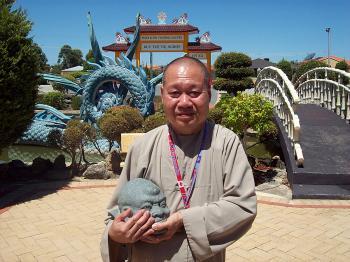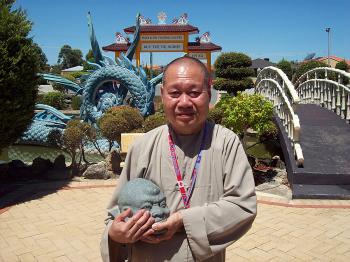Vietnam has waged a brutal overt and covert war against its Buddhist population for decades.
In 1981, they officially outlawed their country’s oldest and original Buddhist Church, the Unified Buddhist Church of Vietnam (UBCV).
The communists attacked the 2000-year-old tradition and created an alternative state-controlled Buddhist Church.
Those who refused to submit allegiance to this new order were imprisoned, tortured, and even murdered.
The current spiritual leader of the UBCV, Nobel Prize nominee the Venerable Thich Quang Do, has spent the last 26 years under house arrest in Vietnam.
His struggle began years ago when as a young monk he witnessed the execution of his Buddhist teacher by the communists.
Viewed as antagonists to communist ideology, Do and his fellow Buddhists are a target of persecution inside, and now outside, Vietnam.
Just days after monks at a Buddhist temple in Western Australia denounced Hanoi’s policies of religious repression, Buddhist statutes at the temple were beheaded. The incident occurred in October and November 2009.
The first desecration occurred after the temple’s head monk, who is the UBCV’s Australian representative, attended a Buddhist conference in Los Angeles, where they announced their determination to oppose Hanoi’s plan to eliminate them.
The second desecration occurred after this same monk sponsored a delegation of UBCV exiles to meet with the Australian government in Parliament House, Canberra. The meeting was organized to advise the government of Hanoi’s religious persecution in preparation for the Australia-Vietnam human rights dialogue to be held in December.
Thus, the beheadings were clearly viewed as a warning to the Australian Buddhists. For Hanoi, the ramifications of Buddhists speaking out on human rights abuses is geopolitical, for their authoritarian regime has come under growing international pressure to cease religious persecution.
In the United States, it was in 2004 that the State Department first designated Vietnam as a “Country of Particular Concern” (CPC), the official watch list of nations that commit egregious religious persecution. CPC designation involves potential economic sanctions, hence Hanoi’s determination to silence any critics.
Hanoi and Washington however, reached an agreement for reform in 2006, with the understanding that Vietnam would be dropped from CPC designation.
Vietnam was indeed removed from the CPC designation and yet the promised reforms never came.
In fact, Vietnam increased persecution, of which Human Rights Watch accused the country of “launching one of the worst crackdowns on peaceful dissidents in 20 years.”
Ever since, calls for Vietnam to be re-designated as a CPC, such as the U.S. Commission on International Freedom, have gone unheeded.
Today, Hanoi has merely morphed its security forces into adopting more covert mechanisms of religious persecution.
These covert mechanisms involve expanding so-called “legal” churches while persecuting “illegal” churches that refuse to submit to communist control. Religious groups across Vietnam—Buddhists, Montagnard and Hmong Christians, Catholics, Hoa Hao, and Cai Dai sects, and other dissidents like democracy advocates, journalists, and bloggers—all face the same repressive measures.
Hanoi’s intention is a ‘divide and conquer’ policy that includes infiltration of overseas dissident groups.
Incredibly, evidence of Hanoi’s policy of persecution comes from their written policies.
The Paris-based International Buddhist Information Bureau has uncovered secret policy directives outlining Hanoi’s intention to attack overseas dissidents.
The overseas spokesman for the UBCV, Vo Van Ai even testified before the U.S. Congress on this fact. Speaking before the House Committee on International Relations on June 20, 2005, he quoted Hanoi’s explicit orders directing Vietnam’s security forces to “wipe out the An Quang Buddhist Church once and for all.”
The “An Quang Buddhist Church” is Hanoi’s term for the UBCV and the secret directives, authored by the Public Security Science Institute in Hanoi are entitled “On Religions and the Struggle Against Activities Exploiting Religion—Internal Document for Study and Circulation in the People’s Security Services.”
In 1981, they officially outlawed their country’s oldest and original Buddhist Church, the Unified Buddhist Church of Vietnam (UBCV).
The communists attacked the 2000-year-old tradition and created an alternative state-controlled Buddhist Church.
Those who refused to submit allegiance to this new order were imprisoned, tortured, and even murdered.
The current spiritual leader of the UBCV, Nobel Prize nominee the Venerable Thich Quang Do, has spent the last 26 years under house arrest in Vietnam.
His struggle began years ago when as a young monk he witnessed the execution of his Buddhist teacher by the communists.
Viewed as antagonists to communist ideology, Do and his fellow Buddhists are a target of persecution inside, and now outside, Vietnam.
Just days after monks at a Buddhist temple in Western Australia denounced Hanoi’s policies of religious repression, Buddhist statutes at the temple were beheaded. The incident occurred in October and November 2009.
The first desecration occurred after the temple’s head monk, who is the UBCV’s Australian representative, attended a Buddhist conference in Los Angeles, where they announced their determination to oppose Hanoi’s plan to eliminate them.
The second desecration occurred after this same monk sponsored a delegation of UBCV exiles to meet with the Australian government in Parliament House, Canberra. The meeting was organized to advise the government of Hanoi’s religious persecution in preparation for the Australia-Vietnam human rights dialogue to be held in December.
Thus, the beheadings were clearly viewed as a warning to the Australian Buddhists. For Hanoi, the ramifications of Buddhists speaking out on human rights abuses is geopolitical, for their authoritarian regime has come under growing international pressure to cease religious persecution.
In the United States, it was in 2004 that the State Department first designated Vietnam as a “Country of Particular Concern” (CPC), the official watch list of nations that commit egregious religious persecution. CPC designation involves potential economic sanctions, hence Hanoi’s determination to silence any critics.
Hanoi and Washington however, reached an agreement for reform in 2006, with the understanding that Vietnam would be dropped from CPC designation.
Vietnam was indeed removed from the CPC designation and yet the promised reforms never came.
In fact, Vietnam increased persecution, of which Human Rights Watch accused the country of “launching one of the worst crackdowns on peaceful dissidents in 20 years.”
Ever since, calls for Vietnam to be re-designated as a CPC, such as the U.S. Commission on International Freedom, have gone unheeded.
Today, Hanoi has merely morphed its security forces into adopting more covert mechanisms of religious persecution.
These covert mechanisms involve expanding so-called “legal” churches while persecuting “illegal” churches that refuse to submit to communist control. Religious groups across Vietnam—Buddhists, Montagnard and Hmong Christians, Catholics, Hoa Hao, and Cai Dai sects, and other dissidents like democracy advocates, journalists, and bloggers—all face the same repressive measures.
Hanoi’s intention is a ‘divide and conquer’ policy that includes infiltration of overseas dissident groups.
Hanoi’s Secret Policy Directives
Incredibly, evidence of Hanoi’s policy of persecution comes from their written policies.
The Paris-based International Buddhist Information Bureau has uncovered secret policy directives outlining Hanoi’s intention to attack overseas dissidents.
The overseas spokesman for the UBCV, Vo Van Ai even testified before the U.S. Congress on this fact. Speaking before the House Committee on International Relations on June 20, 2005, he quoted Hanoi’s explicit orders directing Vietnam’s security forces to “wipe out the An Quang Buddhist Church once and for all.”
The “An Quang Buddhist Church” is Hanoi’s term for the UBCV and the secret directives, authored by the Public Security Science Institute in Hanoi are entitled “On Religions and the Struggle Against Activities Exploiting Religion—Internal Document for Study and Circulation in the People’s Security Services.”



